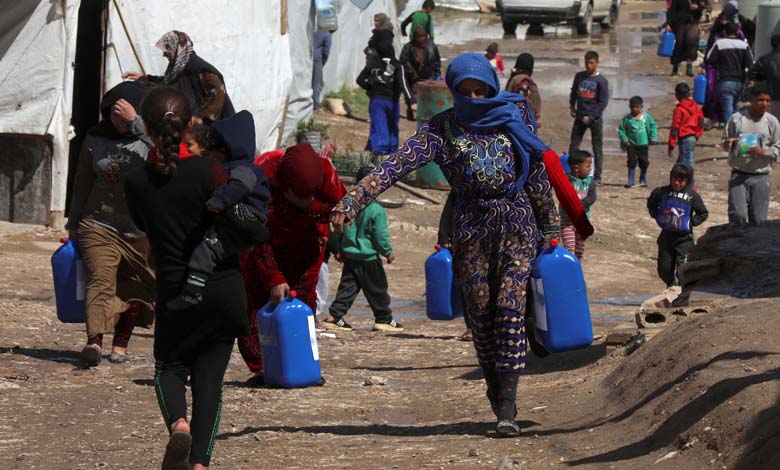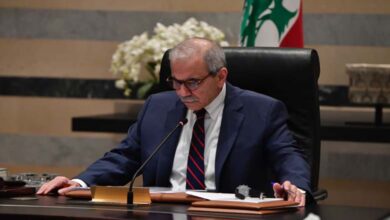The Lives of Syrian Refugees in Lebanon Threatened from All Sides
Anti-refugee rhetoric is spreading in the media and daily conversations, amidst unprecedented consensus from various political forces on the need to find a "comprehensive solution" to the Syrian presence

For weeks, fear has gripped Mariam, a Syrian resident for ten years in northern Lebanon, as authorities complicate residency procedures and restrict movement, amid political demands to deport them to their war-torn homeland.
Sitting by a vegetable stand where her family makes a living on the main road parallel to the village of Minyara in Akkar, Mariam (38) says, “I fear when my husband and children come to work at the stand, I fear for my son that they will take him at any moment.” She adds, “There is fear, we are afraid to walk on the street.”
Lebanon, with a population of over four million, says it hosts around two million Syrians, less than 800,000 of whom are registered with the United Nations, the highest number of refugees in the world relative to the population.
Authorities say the refugee file is a burden beyond their capacity to deal with, especially amidst an unprecedented economic crisis gripping the country for years.
In recent weeks, authorities have intensified the closure of shops violating Syrians and the evacuation of houses and gatherings of refugees living “illegally.” Lebanon resumed, in mid-May, after a hiatus of about a year and a half, the return of refugees to their country within the framework of what it describes as “voluntary return.” However, human rights organizations and the United Nations warn of endangering refugees if they are forced to return to their country, which has been in a deep crisis and war since 2011.
Mariam, who fled with her family from the city of Homs in central Syria, says she tries to ignore negative comments she hears in public places against Syrians and asks her children to follow suit at school.
With worry etched on her face, the woman says, “If we return to Homs, how will my 18-year-old son adapt to the situation there, as he came here when he was six?” She adds, “How will my children accept the situation? No home, no work, no safety.”
Just meters away from her husband’s stand selling corn and beans, seventy-year-old Lebanese Ibrahim Mansour lays out boxes of vegetables and fruits in front of his truck on the main road.
The man, who believes that the departure of Syrians is the solution to the economic burdens of his region, says, “They have stands everywhere, competing with us for any business,” before adding, “When they leave, the situation will improve significantly.”
Anti-Syrian rhetoric in Lebanon is escalating day by day, especially after crimes of theft and murder were blamed on Syrians.
Sahar Mandour, a researcher on Lebanon for Amnesty International, speaks of “incitement campaigns, hatred, legal restrictions, and unprecedented measures to restrict residency,” making the presence of “most of them illegal.”
She adds, “Voluntary return is not possible under these conditions, and deportation violates international law because you are returning refugees to a place where their lives are at risk.”
In a report on April 25, Human Rights Watch spoke of “discriminatory practices for years” against Syrians in Lebanon, noting that the killing of a local party official on April 7 by a group of Syrians, according to the Lebanese army, contributed to “escalating violence.” The report accused Lebanese officials of using Syrian refugees as “scapegoats.”
In Minyara, with a population of only eight thousand, Syrian refugees, numbering about four thousand, are distributed between modest camps in a vast agricultural plain and rented houses.
The mayor of the town, Anton Abboud, acknowledges the need for Syrian labor in professions such as construction and agriculture. But he says his village is unable to accommodate this large number and provide services to them.
“We are not for the expulsion of Syrians who have valid and official papers to stay and work,” he says, adding, “We just want to reduce the number and regulate the Syrian presence.”
Recently, the refugee file has dominated events in Lebanon, coinciding with the approaching date of the Brussels conference on Syria scheduled for May 27.
Anti-refugee discourse has spread widely in the media and daily conversations, amidst unprecedented consensus from major political forces differing on all issues, about the need to find a “comprehensive solution” to the Syrian presence.
Hezbollah Secretary-General Hassan Nasrallah called for opening the sea for refugees to pressure the international community to return them to their country.
Lebanon had previously received assistance from the European Union worth one billion dollars to control its maritime and land borders, against the backdrop of boats of refugees flowing from Lebanon to Cyprus, a member of the European Union.
In a refugee camp with dozens of white tents near Minyara, livestock seller Haji, engaged in sheep shearing, says recent security measures have disrupted sales.
The man (37), who entered Lebanon illegally after fleeing his hometown in eastern Hama during battles between the Syrian army and ISIS eight years ago, says, “Syrians can no longer move… everyone is afraid.”
He fears returning to Syria because he is wanted by the authorities, adding that in Lebanon, he fears “going out on the main road.”
His elderly father, over seventy years old, shares the anxiety, saying, “If we leave, we will die of hunger, there is no livelihood in our country, it is better for one to throw themselves into the sea.”












